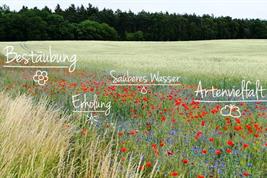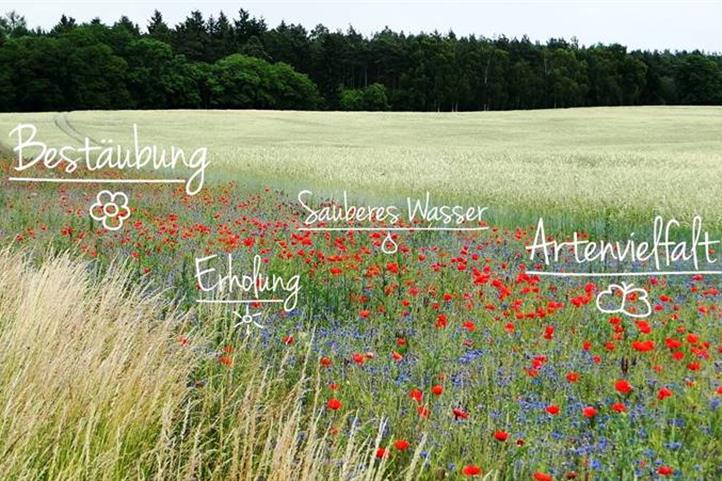Press Release

Shoes, travel, cars – there is now an online marketplace for almost everything. Researchers at the Leibniz Centre for Agricultural Landscape Research (ZALF) want to transfer successful, Internet-based business models to previously largely unexplored territory: nature conservation. At the Hanover Fair from 23-27 April, at the joint Berlin-Brandenburg stand, Hall 13 Stand C10, they are presenting the “AgoraNatura” project, their idea for an online marketplace in which companies and private individuals can invest in nature conservation projects whose benefits have been scientifically proven.
Unspoilt nature is the basis of our well-being and economic activity – this starts with fresh air and clean water and by no means ends with a walk in the countryside. Nevertheless, we are placing ever greater demands on nature and thereby endangering its efficiency. Financial commitment is necessary to preserve biological diversity and natural resources. At present, nature conservation projects are largely financed by the state or through donations. However, the funds available are not sufficient and many projects, ideas and initiatives lack the necessary money. To remedy this situation, the “AgoraNatura” project was launched in 2015 under the direction of ZALF and with the participation of the University of Greifswald, Environmental Action Germany (DUH), and the German Association for Landscape Management (DVL).
“First of all, we conducted initial potential analyses for such a marketplace and identified motives and expectations from the perspective of companies and private individuals”, says
Professor Bettina Matzendorf, Project Manager at ZALF. In a next step, specific nature conservation projects were compiled and offered on the online marketplace. The current project regions will be presented at the exhibition stand. The current pioneer projects are located in Brandenburg. In the future, projects from all over Germany will be available on AgoraNatura. At present, the focus is on topics relating to the agricultural landscape, i.e. areas primarily used for agriculture. But this is only the beginning; the platform will gradually open up for further nature conservation topics and projects.
The researchers' benchmark for the inclusion of projects in the online marketplace is high: The nature conservation projects are to be certified according to the new, independent Naturplus standard, which establishes their impact on biodiversity, clean water, climate protection and the landscape in a transparent way. Natureplus has been developed by the AgoraNatura research team in cooperation with other partners and is a project-independent, publicly accessible standard. The participating companies are thus assured that their money is invested sensibly and that they can provide concrete proof of the nature conservation effect of their participation.
“The first version of the marketplace is due to go online in the coming months. We are currently looking for pioneering companies that are prepared to acquire the first nature conservation certificates and enter the final testing phase with us,” explains Professor Matzdorf
AgoraNatura at the Hanover Fair: Joint Berlin-Brandenburg stand in the “Energy” section, Hall 13, Stand C 10
The “AgoraNatura” project is funded as part of the joint Federal Ministry for Education and Research (BMBF) and Federal Ministry for the Environment, Nature Conservation and Nuclear Safety (BMUB) funding initiative “Research to Implement the National Biodiversity Strategy” (F&U NBS) and at the BMUB through the Federal Biological Diversity Programme.
 Press release as PDF file
Press release as PDF file
More information:
Bildmaterial
Zum Download der Bilder bitte auf das entsprechende Bild klicken und über
 herunterladen.
herunterladen.

Bildunterschrift: Beispiele für Ökosystemleistungen, die ein Blühstreifen bereitstellt | Quelle: © Holger Pfeffer, ZALF
About the Leibniz Centre for Agricultural Landscape Research (ZALF) in Muencheberg, one of the institutes of the Leibniz Association:
ZALF's mission is to scientifically explain causal relationships in agricultural landscapes, and to provide society with a knowledge-base for the sustainable use of agricultural landscapes through excellent research. Unlike natural landscapes, agricultural landscapes are shaped by their use and their users. The research at ZALF therefore comprises the social demands placed on agricultural landscapes and the effects of their use. ZALF has been increasingly concentrating its research on the Grand Societal Challenges relevant in the context of agricultural landscapes, such as climate change, food security or the protection of biodiversity.
